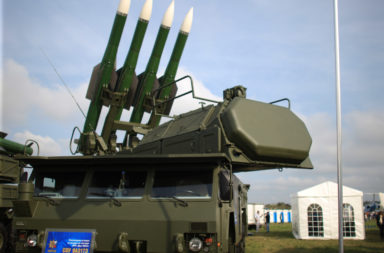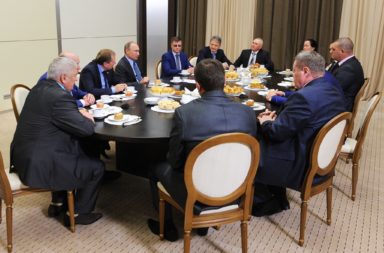After the Ukrainian crisis tensions have risen around the Baltic Sea. Russia has violated air spaces several times. Threatened its neighbouring countries directly and non-directly by using different hybrid warfare methods from media propaganda to military exercises.
This is the result because Russia lost its pro-Russian government in Ukraine. President Viktor Yanukovych fled from Ukraine, and is now living in exile in Russia. However, Russia was able to conquer Crimea and it has continued its military efforts in eastern parts of Ukraine.
As a result, the West decided to lift sanctions against Russia, which have hurted Russia’s economy severely. Russia worsened its economical situation by proposing sanctions against the West. For many years Russia has been trying to unbalance Ukraine but with poor results. Russia became bitter because its strategy has not functioned. Ukraine has taken several steps towards west integration. Russia has also challenges with Belarus. Hence, its sphere of influence is weakening. At the same time Russia has growing domestic challenges.
Therefore, Russia started its harassment campaigns in the Baltic Sea, which has two military non-aligned countries, Sweden and Finland. These two countries have created a grey zone when it comes to the military strength of the West – and Russia is using this loophole. However, NATO’s previous Secretary General Anders Fogh Rasmussen said in 2014 that Finland and Sweden would be accepted as NATO members with a rapid schedule. NATO source said according to Observer that both countries would be accepted within a week.
One of the reasons why Sweden and Finland have not joined NATO is because both countries do not want to escalate the tense situation even more, hence, not to upset Russia. But Russia can see this situation as a weakness. Especially, Finland has been criticised that it is practicing Finlandization again, like during the Cold War with the Soviet Union. Finlandization means that a smaller country is abiding foreign policy rules of a larger country. Hence, a smaller country would not join NATO when a larger country is opposing this sort of step.
Finlandization accusations have sparked heavy debates in Finland because Finland might be practicing fake Finlandization. No one knows exactly what Finland is actually thinking, and this can create a major headache for the West and Russia. Russia wants to isolate Finland from the West by encouraging her to practice “neutral” and “independent foreign policies”. In this case “independent foreign policy” does not mean joining NATO effortlessly.
Sweden and Finland have promised that both countries will not join NATO without consulting both parties in advance. Finland, especially worries that Sweden might join NATO as a surprise because Sweden is more willing to join NATO than Finland. Sweden has anchored herself very tightly to the West, and might even see that she has a special relationship with the United States.
In contrast, some Finnish foreign policy experts believe that Finland has a special relationship with Russia, and because of that current tense situation would not escalate even more. Finland’s former ambassador to Moscow Hannu Himanen has said that this is pure imagination because Finland is a member of the West, and therefore, it does not have a special relationship with Russia. This situation means that it would be wise for both countries to seek a special relationship with the United States in order to strengthen “the grey zone”.
Why these countries are not members of NATO when they are members of the European Union, Finland is even a member of the eurozone? Sweden and Finland were a single country from the 13th to 19th century. In 1809 Sweden lots its Eastland to the Russian Empire. After several wars, and as a former empire, Sweden decided to practice neutrality in foreign affairs. As a result Sweden has been able to be an outsider of wars since 1814, after the conquest of Norway. It can be argued that Sweden has not been a neutral country after the World War II because it had substantial cooperation with the West and very close ties with the United States. After the cold war Sweden’s neutrality became an idealistic doctrine. “The world has gone to a stage of an eternal peace and we will not face any wars.” Therefore, Sweden did not have a desire or a true need to join NATO.
Finland had a similar sort of approach. However, Finland joined The European Union merely for security policy reasons in 1995, and joining the eurozone in 1999 was a part of the same process. However, in 2000s Finland halted its west integration process by not joining NATO. Finland believed that increasing interdependence would make NATO obsolete. Still, there was not any analytical discussions concerning the membership. On the contrary, 2000s NATO discussion was extremely propagandistic from those who were strongly against the membership. Soviet style propaganda was quite in common in discussions. Where discussion participants brainwashed, Russia-minded agitators or not? Hard to tell but new revelations are on the way. Finnish pro-west politicians have continued with balanced arguments.
Therefore, the NATO debate did not go any further, and it is still very poor. The main reason why the NATO debate does not go any further is because some people believe that Finland’s membership would mean a direct conflict with Russia. NATO supporters are saying that Finland’s NATO membership is Finland’s internal issue and the membership would not threaten Russia – everyday relations would continue. Hence, Russia’s possible reaction is dominating the whole debate. Russia might have an overemphasized role in Finland because Russia is a declining country, and some Finnish foreign policy experts might not see that the West is a strong actor in global affairs. Finland is no longer a lone wolf. Has she never been?
In the future, one of the major issues can be the cross bet between Sweden and Finland. Sweden has anchored herself strongly to the West. On the other hand, Finland might look like a weathercock for the rest of the West. Some Finnish foreign policy influencers call this “solidity foreign policy”. Old Cold War phrases like “Finland is between the West and the East” have came back. These sort of sayings can be quite insulting for western powers. This might create a situation that Sweden could abandon Finland and join suddenly NATO because Sweden can not anchor herself into an uncertain environment, which could harm its security, economy and prosperity.
At the moment both countries have a solid backing from the West and therefore these countries should behave more single-mindedly because this would strengthen “the grey zone”, and make the West even more stronger. NATO experts have said that Sweden and Finland should stay together. Although, Sweden is the stronger actor and Finland should ease a bit in order to keep the relationship solid.
However, Baltic states, and even Albania and Montenegro have been able to join NATO. Therefore, Sweden and Finland could effortlessly join the alliance because NATO would provide security guarantees during the membership process. It can be asked. Are NATO memberships just a question of steady political leadership? Some people could argue that this is the case, and Sweden and Finland have made life difficult and too complex for the rest of the West. Both countries have extremely close cooperation with NATO.
Therefore, memberships would be natural steps because citizens in both countries are living the western lifestyle to the fullest, and they are not willing to decrease their freedoms and wellbeing because of authoritarian Russia but some old school lobby groups might not have noticed it. A vast number of Finns still remember what was it like to live next to the Soviet Union during the Cold War, and they do not want dark days to return.





